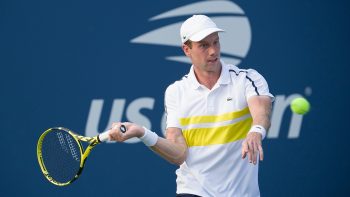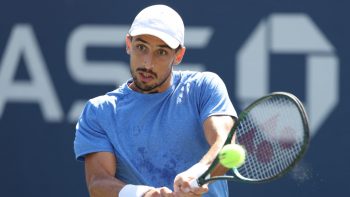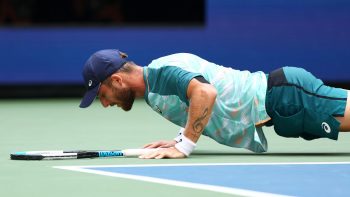Coach Evan went through the trouble of going through Corentin Moutet’s matches at the US Open 2022. It revealed some interesting ideas.
Corentin Moutet
Round 1 vs. Stan Wawrinka.
This was a case of a guy not back to form yet and another guy (Lucky Loser) playing on House money. It was also a bad matchup for Stan. Moutet plays far behind the baseline and makes you hit many balls.
From a game plan standpoint, Corentin Moutet started the match going after Wawrinka’s backhand on the return games and the forehand on the service games. A flip/flop plan. These plans work. Especially when you flip the plan later in the set (if needed), generally, if you are losing, you will adjust the plan. If you are winning, chances are you will slightly adjust the plan before the set is over.
Why? So you kick back the plan at the beginning of the second set.
A mistake college players and future players make is keeping the game plan going and not wavering. Once they continue it too long it’s either obvious a change has to come or they’re hitting too big on the pattern and burning mistakes after mistakes (errors and positional mistakes).
To explain the concept deeper, we need a match video. Because sometimes all you need is a few minor tweaks to a plan to divert the mind. Like on game points.
One problem that pops up is, say you want to adjust by the end of the set, and your opponent is playing like crap and can’t get a rhythm going. Double faulting on big points. Missing easy returns at the end of the game etc.
At that point, you are re-establishing the original game plan.
-When a player plays far behind the baseline like Moutet, you must play the angles.
Easy, right?
After watching Moutet, I would use the deep middle of the court to set up the power angles. Then to set up the redirects (Wu used a similar plan in qualies round 3. I was lucky enough to watch that match live).
(I will write up a training drill on how to beat players that play so far behind the baseline).
ZONE tennis
**A lot of the pros are still playing ZONE tennis. This match is a case of zone training not working. Zone tennis is predicated on fitness and depth, and power. Yes, it can have a little defense in there, but what will you do when you don’t have much time to train or are coming back from injury?
Zone tennis training.
It plays right into Corentin Moutet’s game.
But that style has to cover a lot of real estate, and your body will not last over time.
Round 2 vs. Botic Van De Zandschulp.
Say that name five times.
Lets just call him Van Damme.
There’s something that bothers me about this guy. He looks so laissez-faire.
“Papa will pick us up in the Bentley, Sara,” Botic said. “We will eat dinner at the Trattoria Graziella.”
“Again?”
Botic ignored her.
“After dinner, we will return to the Chateau Amsterdam and do the ramster dam.”
“You mean make love?”
“No! We will do, the ramster dam.”
“Whatever, Botic, you weirdo.”
“And then I will watch “The Big Lebowski.”
Sara rolled her eyes.
Moutet is getting after it this match. He’s not retreating so far back…at least not in the first set.
And Déjà vu.
He wins again.
What a great write-up.
To be honest, it was very similar to Round 1.
Moving on to Round 3
I want to move ahead and see what Ruud did and if he used the sidelines like the others should have.
Round 3 Vs. Pedro Cachin.
Right away, the stat line from the announcers annoys me. The first serve win % and the second serve win %. They’re talking about how the players have to get that % up.
It’s not about the %.
It’s about the strategy that goes along with moving up levels.
Are you just pushing the serve in?
Are you hitting the same spot every time?
Are you telegraphing your location?
From a strategic standpoint, I stopped hitting kick serves only on second serves last year. Sometimes I hit two first serves (the Second is more of a hard cut/slice). It puts more pressure on the returner. Now they are on alert.
How you approach your contact point on serve matters too.
I rarely use “true” (flush) flat serves. This is when the racket head is pointing up at contact. Instead, I’ll be slightly angled with my racket pointing left at contact at like 60 degrees. This allows for a “natural” spin but doesn’t take too much pace off the serve.
It adds a little more control and increases your %age.
Side note. Moutet has steadily gotten more aggressive on his forehand after the qualies. It’s as if he played super defensive to get through qualies (losing in Round 3).
Will he go back to what he knows as the Cachin match wears on and he thinks about getting through to the next round?
Corentin Moutet is a worker
Moutet reminds me of a buddy I grew up with. Both are workers. Both can get aggressive. Both are small in stature and they will fight till the end. But one difference (maybe) is when my buddy throws down a few beers he’s susceptible to being prodded into doing things he might not normally do.
Like throwing a hotdog into a crowd of people at an outdoor concert.
Dumping a beer on some random guys head at a nightclub.
Or causing fights with bouncers.
I’ve never played a 3 out of 5 set match (only goofing locally back in the day), but I can imagine it plays tricks on the mind. For me, it’s like playing your first few rounds of golf at the beginning of the season and crapping out mentally on hole 12. And how one bad hole ruins the rest of the round.
The hold of serve by Cachin at 2-2 in the third set had some weight to it. Off the top of my head, the missed overheads could be a negative seed, meaning after he missed the two in that game it could trigger a thought on the changeover from a past coach (or current) giving him crap over missing them in practice.
Clear your thoughts
It’s crazy what the mind will call up throughout the day, especially during a match, which is probably why so many players and athletes use meditation to clear their thoughts.
When you play on instincts, feel, fed ball, hitting to spots, footwork, you are doomed to fail. Those are by-products.
You want to train in point structure.
Without Box training it’s tough.
What are you going to do?
Play deep when you are down?
Everyone knows that.
Play crosscourts?
They know that too.
If you do that, it becomes a game of hope.
If you Box train, you can have specific plans to do at certain times in the game, the set, and the match and know how to deviate and adjust that plan.
What are you going to adjust with a crosscourt game plan?
Attack?
No shit.
My writing’s getting aggressive because the power went out.
Twice.
And I had to restart.
I’m a little annoyed.
Life goes on.
Last thing.
Cachin played not to lose at the end of the match. Crosscourts. Simple point structure. Hoping Corentin Moutet would miss.
It can work.
But not that day.



















I’m sorry but I just zone out when Evan is writing, the round 2 write-up was literally a waste of my time. I like your content in general Jonas, but Evan just isn’t my cup of tea.